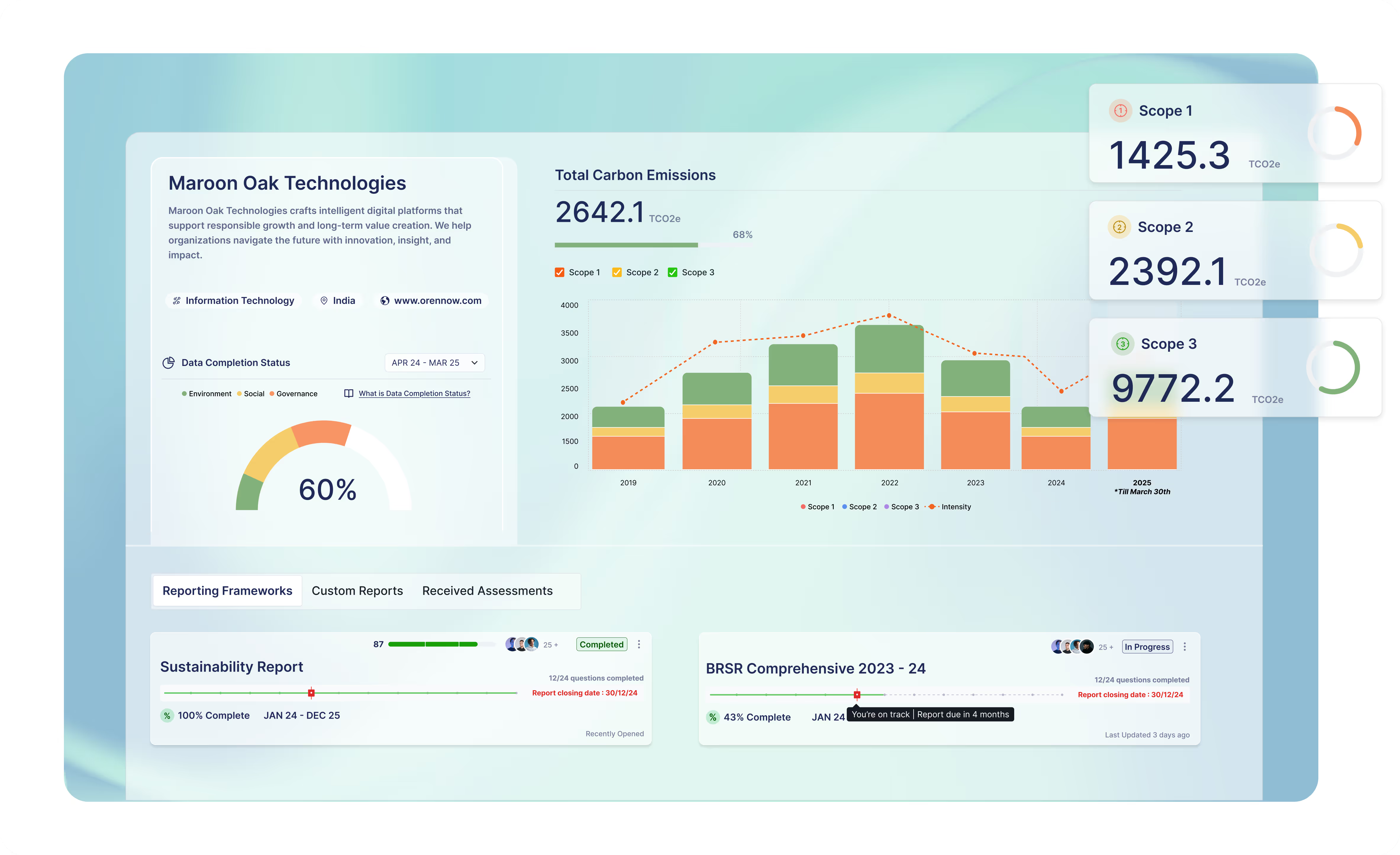EcoVadis: Decoding The Latest Sustainability Rating System

EcoVadis & its Sustainability Rating System
Ecovadis is a global leader in sustainability ratings, evaluating over 150,000 companies across various industries. The EcoVadis rating system assesses corporate sustainability based on 21 criteria categorized into four key themes:
1. Environmental Impact
2. Labour and Human Rights
3. Ethics
4. Sustainable Procurement
To get an EcoVadis rating, companies have to create an account on the EcoVadis portal, after which they have access to the EcoVadis questionnaire based on their industry and size. Companies are expected to respond to questions regarding their policies, actions, or initiatives; certifications; and which are all divided across the four themes listed above.
At the end of this, companies get an Ecovadis score between 1 and 100. Companies could sign up themselves to get an EcoVadis score, or get a request from their customers to attain an EcoVadis score. The EcoVadis rating system is extensively used by industries that have complex supply chains, such as Pharmaceutical manufacturing, Automotive manufacturing, Chemical manufacturing etc.
.avif)
Why is the EcoVadis Rating Important?
In today’s business environment, sustainability is a crucial consideration for investors, customers, and partners. Based on our experience, we have observed that the Ecovadis rating is especially important amongst large companies such as Pfizer, Novartis, BASF etc. that wish to assess the sustainability maturity of their suppliers. Sometimes companies mandate a particular ESG score as part of their supplier due diligence process. In addition to this, companies also mandate a minimum EcoVadis score for their existing suppliers. This helps the large companies understand where their suppliers stand from a sustainability perspective. Think of this to be like a leaderboard wherein suppliers with a higher score tend to have a higher maturity on their sustainability versus suppliers with a lower score.
We have also seen certain investors show interest in looking at the Ecovadis sustainability ratings of their portfolio companies or a company they wish to invest in.
Why Top Enterprises Are Using EcoVadis in their Procurement Strategies
For most industries, 70-80% of their carbon emissions lie across their supply chain. Not only that, we would say that even 70-80% of their sustainability impact lies across their supply chain. And hence we believe it is extremely important for companies to get a pulse of the sustainability maturity of their suppliers, and the Ecovardis score is a great way to understand that.
We believe that to truly implement sustainability, companies should look at embedding sustainability practices across all functions and all departments of the organization. And this is especially true for the procurement department. The procurement department, sometimes, lacks the knowledge needed to assess the sustainability maturity, and practices of suppliers, and that is where EcoVadis sustainability rating system acts as the perfect barometer.
Top enterprises also use the EcoVadis score as a way to embed their sustainable procurement goals and their other ESG goals across their supply chain. This also helps them partner with their suppliers and indeed helps them become more sustainable.
How to Obtain an EcoVadis Certification?
Achieving an EcoVadis rating involves a four-step process:
1. Register Online:
Companies can start by creating a company profile, including details about your business activities and contact information. This helps customize a specific questionnaire for your company based on your industry, sub-industry and size.
2. Complete the Questionnaire:
You can then answer the tailored questionnaire and upload relevant documents. Documentations are an essential part of the Ecovadis score attainment process as each and every response of the questionnaire has to mandatorily have a supporting document as proof. Ecovadis has guidance on what the structure and construct of these documents have to be like. Ecovadis has a limit on the maximum number of documents you can upload as proof for your responses.
3. 360 Degree Watch:
Once you have submitted the questionnaire, Ecovadis conducts a 360 degree Watch analysis which comprises looking through relevant public information about a company's sustainability practices that have been identified via more than 100,000 data sources including NGOs, press and trade unions. At the end of this , a company could have a positive, negative or no score impact.
4. Expert Analysis:
EcoVadis analysts evaluate the company’s responses and accompanying documents to create a Scorecard which contains an individual score on the four themes of Environmental Impact, Labour and Human Rights, Ethics and Sustainable Procurement and an overall combined score, all out of 100.

How to Embed EcoVadis Ratings Across Functions & Teams
We recommend that companies involve all internal departments such as HR, procurement, EHS, IT etc. in their Ecovadis score improvement exercise. Here are some initiatives that companies can start with:
- Each department should ensure that all the relevant employees, workers and other stakeholders are being trained in the policies created by their department. For example, if the company has an IT security and data privacy policy, the IT team should ensure all employees go through training for the same. The IT team should also maintain the attendance for these trainings.
- The goals and KPIs set in place in each policy should be tracked by that respective department for better execution. The goals and KPIs should be aligned with EcoVadis scoring themes.
- Departments should prioritise conducting third-party audits on their data and processes wherever possible.
- Departments should track monthly data to track performance and to contribute positively to the ESG report.
- Departments should lastly ensure that they are maintaining proper documentation on all the policies, data, training, initiatives etc. that can be used as proof for the Ecovadis rating submission.
Understanding the EcoVadis Methodology
The EcoVadis rating methodology focuses on evaluating the quality of a company's sustainability management across the following pillars:
1. Policies:
Ecovadis requires the presence of formal policies, endorsements, and overall management commitment across its four themes. These endorsements also have to be from external, globally recognized bodies such as UNGC. It is extremely important to ensure that each of these policies include:
- Coverage of the policy (i.e., which stakeholders do you cover through this policy, such as business partners, suppliers, employees, etc.)
- Goals and targets
- Grievance mechanism
2. Action:
EcoVadis requires you to disclose what actions you have taken to embed sustainability across its four pillars. This could include any certifications that you might have undertaken or initiatives that you have implemented to reduce emissions, increase awareness of human rights across your operations etc. This also needs you to disclose what is the coverage of your policies and actions. For example, if you have a human rights policy, Ecovadis wants to know what stakeholders are covered in it (employees, suppliers, business partners). For the stakeholders that are covered, what are you doing to increase their awareness regarding this subject and how are you tracking your progress.
3. Results:
Ecovadis covers two things, how you are reporting on the above and it does a 360-degree watch to assess news sources, NGO databases, etc. in your country and sector to see if there was a positive or negative news regarding your company.

EcoVadis Medals: The New Rating System
Based on a company's EcoVadis score, EcoVadis gives them one of the following four medals:
Platinum - Top 1% (99+ percentile)
Gold - Top 5% (95+ percentile)
Silver - Top 15% (85+ percentile)
Bronze - Top 35% (65+ percentile)
This percentile calculation happens at the time the company’s EcoVadis score is published, and EcoVadis looks at all the companies’ scores in their database over the last 12 months. To attain any kind of medal, a company also has to ensure that their score across all the four themes of EcoVadis is more than 30.
In addition to the medals stated above, EcoVadis also gives out badges of two types:
- A company could get a committed badge if it has a minimum Ecovadis score of 45
- It could get a fast mover badge if it has an EcoVadis score ranging between 34 to 44 with a minimum six-point improvement on its previous year's assessment
In addition to the above, it is important to note that certain companies are not eligible for either the EcoVadis medal or the EcoVadis badge. These are companies that manufacture tobacco products, weapons, or ammunition. Companies whose business involves mining of coal or lignite, or that have more than 20% of their revenue coming from coal sources. Companies with more than 20% of their power generation from coal-based sources or from exploration and production of unconventional oil and gas are also excluded from the EcoVadis badge or medal.

EcoVadis and Supply Chain Sustainability
EcoVadis plays a significant role in improving supply chain sustainability. For buyers, it provides a means to evaluate suppliers' sustainability performance and maturity accurately, helping identify more sustainable options or encourage improvements among current suppliers. Buyers can also use the Ecovadis sustainability rating to improve their relationships with their suppliers.
Suppliers benefit by benchmarking their performance against competitors and gaining insights to enhance their sustainability efforts, thereby strengthening their market position. Suppliers can easily use the Ecovada's medals and badges for this purpose
Strategies to Enhance Your EcoVadis Score
To improve your EcoVadis rating, consider the following strategies:
1. Capture KPIs and Targets:
Document key performance indicators (KPIs) and sustainability targets related to all four themes. Ensure they are included in your sustainability report.
2. Align with UN SDGs:
Align your sustainability report and track KPIs with the United Nations Sustainable Development Goals (SDGs).
3. Set SBTi Targets:
Commit to Science-Based Targets Initiative (SBTi). This is a great way to capture and showcase your net zero goal with an external endorsement.
4. Organize Documentation:
Prioritize and organize your documents effectively. Ensure they are well-structured, include your company’s logo, and are signed by relevant department head or top management. All documents should clearly communicate what part of your operations they cover. For example, does it only cover one particular plant or all plants of the organisation. Ensure you have documentation and evidence of all sorts, including policies, certifications and reports.
5. Engage Suppliers:
Implement a formal supply chain sustainability program and provide training on supplier codes of conduct, employee health and safety and responsible procurement policies. We also recommend collecting data on key ESG parameters from your suppliers.
6. Learn from feedback of previous score:
If you have already undergone the Ecovadis assessment process in the previous year, you will get a scorecard with areas of improvement which can act as a great implementation plan for the current year.
Best Practices to Achieve a High EcoVadis Score
We have worked with organizations across all sectors to help them improve their ECOVA score. Here are some things that our experts recommend as best practices to achieving a high Ecovadis score:
- Ensure that all your policies are signed by your Board of Management.
- Ensure you conduct employee and supplier trainings on the policies that you have implemented.
- Try to add a target and corresponding KPIs to policies wherever relevant.
- A materiality assessment is a great way to boost your score.
- You can easily structure your initiatives, the key data against those initiatives and results in a sustainability report that is either aligned with GRI, BRSR, or any other global standard. This sustainability report can also be aligned with the UNGC principles to further boost up your score.
- Getting an external assurance on your GHG emissions data is always a good idea.
- Using a technology platform like the Oren Sustainability Hub is a great way to have a real-time update on your key ESG goals and corresponding metrics.
- Ensure that you have 100% coverage of the entity you are reporting through. For example, if you are only conducting the Ecovadis assessment for a particular factory, ensure that the certifications, reports and endorsements cover that. In case you are doing the Ecovadis assessment for the entire company, make sure that your certifications, reports and endorsements cover all your operations.
- We have noticed that the Sustainable Procurement theme is one of the hardest themes for companies to improve their score on. To easily improve your score on this theme, we recommend having a supplier code of conduct in place and conducting trainings across all your suppliers (at least your critical suppliers) on this particular policy.
Final Thoughts
Rating, such as the EcoVadis sustainability rating, is also a great way for you to keep a track on how your sustainability metrics compare to your competitors. A higher EcoVadis rating is essential to keep your current customers happy and bring on new ones.
For expert guidance on improving your EcoVadis score, schedule a call with our team today. Our team has supported multiple organizations across all sectors, improving their individual theme score and also their overall EcoVadis score. Oren brings in a combination of a world-class technology platform, Oren Sustainability Hub that can act as a way for you to seamlessly create your sustainability report and track your sustainability goals and KPIs in real-time. This platform also helps you benchmark your performance against your peers. In addition to this, our EcoVadis experts will guide you on the best practices at each and every step.
Frequently Asked Questions
1. What are some quick and zero-cost ways of improving my Ecovadis score?
We recommend looking at your policies. Some questions that you should ask yourself are:
- Are all my policies approved by the board?
- Do all my policies clearly mention what part of my operations and my stakeholders does it cover?
- Does my policy have a grievance mechanism?
- Have I conducted trainings across my employees, my contractors, my suppliers on the policies that are relevant to them?
2. Do I need a sustainability report for a higher Ecovadis score?
A sustainability report in either a GRI or a BRSR or any other global framework is an easy way for you to bring all your sustainability initiatives in one document. You can upload this on your company website so that it's accessible to all your key stakeholders. Then it can definitely act as a single document proof that covers multiple Ecovadis questions.
3. How Is EcoVadis Different from ESG?
EcoVadis is very different from ESG. EcoVadis is a company that gives other companies an ESG rating based on their ESG maturity and performance across four key themes of Environmental Impact, Labour and Human Rights, Ethics and Sustainable Procurement. It is not an ESG framework itself. This ESG rating is a score from 1 to 100 and companies are expected to submit documentation as proof for each response they provide to the EcoVadis Questionnaire.
4. Which Companies Use EcoVadis for Sustainability Assessment?
Companies across all sectors and size can use EcoVadis as a sustainability assessment. The most common use case we have observed is by companies that wish to demonstrate their sustainability maturity to their customers.
5. Why Is EcoVadis Suitable for Companies of All Sizes?
The EcoVadis questionnaire changes based on the industry and size of the company and hence it can be utilised by companies of all sizes.
6. EcoVadis vs. CDP: Which Sustainability Rating Fits Your Business Best?
EcoVadis focusses on four themes: Environmental Impact, Labour and Human Rights, Ethics and Sustainable Procurement while CDP or Carbon Disclosure Project just focusses on the Climate Change related issues. Typically, the best way to determine which of the two fits a company’s needs better is to figure out what their stakeholders care about the most. These could be stakeholders such as customers, investors or banks. Over time, most companies end up submitting disclosures on both but doing a thorough job at one before picking up the other is always a good idea.
7. What Does the EcoVadis Assessment Process Involve, and How Long Does It Take?
At Oren, we break down the EcoVadis Assessment process into three parts, the first part is to determine the current gaps in a company’s ESG strategy and implementation. Then comes the implementation of the initiatives and processes to fill those gaps and lastly comes the process of filling out the Ecovadis assessment questionnaire and uploading the relevant documents. The second part is the most time consuming part and could take from 3-6 months to complete depending on the company’s ESG maturity. If all the documents are ready and organised, the filling of the EcoVadis questionnaire doesn’t take more than 1-2 weeks to complete.





